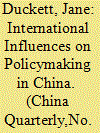|
|
|
Sort Order |
|
|
|
Items / Page
|
|
|
|
|
|
|
| Srl | Item |
| 1 |
ID:
103985


|
|
|
|
|
| Publication |
2011.
|
| Summary/Abstract |
Over the last two decades an economic reform paradigm has dominated social security and health research: economic reform policies have defined its parameters, established its premises, generated its questions and even furnished its answers. This paradigm has been particularly influential in accounts of the early 1980s' collapse of China's rural co-operative medical system (CMS), which is depicted almost exclusively as the outcome of the post-Mao economic policies that decollectivized agriculture. This article draws primarily on government documents and newspaper reports from the late 1970s and early 1980s to argue that CMS collapse is better explained by a change in health policy. It shows that this policy change was in turn shaped both by post-Mao elite politics and by CMS institutions dating back to the late 1960s. The article concludes by discussing how an explanation of CMS collapse that is centred on health policy and politics reveals the limitations of the economic reform paradigm and contributes to a fuller understanding of the post-Mao period.
|
|
|
|
|
|
|
|
|
|
|
|
|
|
|
|
| 2 |
ID:
000491


|
|
|
|
|
| Publication |
London, Routledge, 1998.
|
| Description |
xx,273p.
|
| Standard Number |
0415187419
|
|
|
|
|
|
|
|
|
|
|
|
Copies: C:1/I:0,R:0,Q:0
Circulation
| Accession# | Call# | Current Location | Status | Policy | Location |
| 041908 | 338.951/DUC 041908 | Main | On Shelf | General | |
|
|
|
|
| 3 |
ID:
164410


|
|
|
|
|
| Summary/Abstract |
Previous research has credited China's top leaders, Hu Jintao and Wen Jiabao, with the social policies of their decade in power, arguing that they promoted these policies either for factional reasons or to achieve rational, problem-solving goals. But such arguments ignore the dominant “fragmented authoritarian” model of policymaking in China that centres on bargaining among bureaucratic agencies. This article asks whether top leadership factions, rational problem solving, or “fragmented authoritarianism” can explain the adoption of one of the Hu and Wen administration's flagship policies, New Rural Cooperative Medical Schemes. Based on a careful tracing of this policy's evolution, it finds little evidence for these explanations, and instead uncovers the role played by international events and organizations, and ideas they introduced or sustained within policy networks. The article highlights some of the effects that China's international engagement has had on policymaking and the need to go beyond explanations of the policy process that focus solely on domestic actors. It proposes a new model of policymaking, “network authoritarianism,” that centres on policy networks spanning the domestic–international, state–non-state, and central–local divides, and which takes account of the influence of ideas circulating within these networks.
|
|
|
|
|
|
|
|
|
|
|
|
|
|
|
|
| 4 |
ID:
081529


|
|
|
|
|
| Publication |
2008.
|
| Summary/Abstract |
This paper considers China's state capacity and changing governance as revealed through its policies to tackle unemployment. Despite high levels of growth, economic restructuring has resulted in rising unemployment over the last decade. The Chinese state has been able to manage job losses from state enterprises, demonstrating some state capacity in relation to this sector and some persistent command economy governance mechanisms. However both design and implementation of policies to compensate and assist particular groups among the unemployed have been shaped by weak state capacity in several other areas. First, capacity to gather accurate employment data is limited, meaning local and central governments do not have a good understanding of the extent and nature of unemployment. Second, the sustainability of supposedly mandatory unemployment insurance schemes is threatened by poor capacity to enforce participation. Third, poor central state capacity to ensure local governments implement policies effectively leads to poor unemployment insurance fund capacity, resulting in provision for only a narrow segment of the unemployed and low quality employment services. Although the adoption of unemployment insurance (and its extension to employers and employees in the private sector), the introduction of a Labour Contract Law in 2007, and the delivery of employment services by private businesses indicate a shift towards the use of new governance mechanisms based on entitlement, contract and private sector delivery of public-sector goods, that shift is undermined by poor state capacity in relation to some of these new mechanisms
|
|
|
|
|
|
|
|
|
|
|
|
|
|
|
|
| 5 |
ID:
151459


|
|
|
|
|
| Summary/Abstract |
Recent research on authoritarian regimes argues that they provide public goods in order to prevent rebellion. This essay shows that the ‘threat of rebellion’ alone cannot explain Chinese party-state policies to extend public goods to rural residents in the first decade of the twenty-first century. Drawing on theories of policy making, it argues that China’s one-party regime extended public goods to the rural population under the influence of ideas and policy options generated by policy communities of officials, researchers, international organisations and other actors. The party-state centre adopted and implemented these ideas and policy options when they provided solutions to external shocks and supported economic development goals. Explanations of policies and their outcomes in authoritarian political systems need to include not only ‘dictators’ but also other actors, and the ideas they generate.
|
|
|
|
|
|
|
|
|
|
|
|
|
|
|
|
|
|
|
|
|